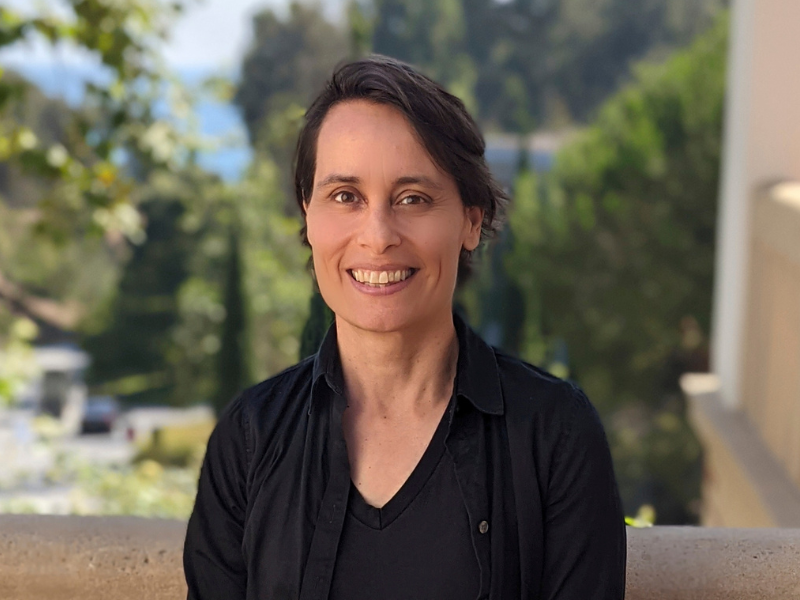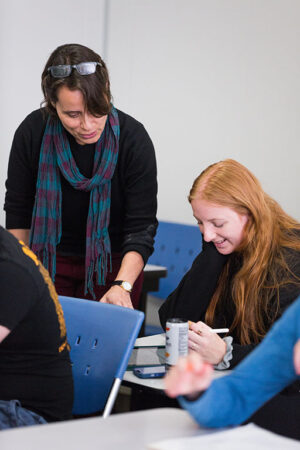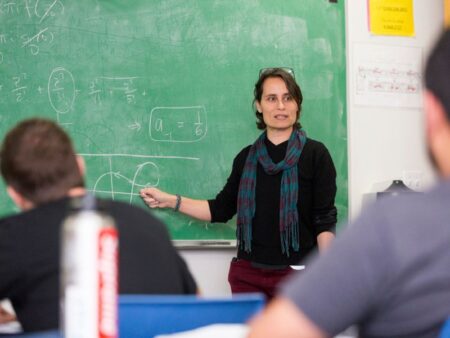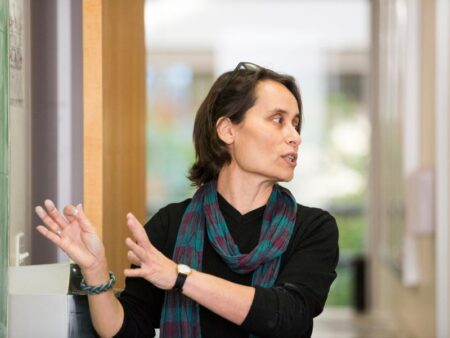
Loyola Marymount University Professor and Chair of the Mathematics Department Lily Khadjavi was named the inaugural recipient of the Mary and Alfie Gray Award for Social Justice presented by the Association for Women in Mathematics (AWM). Khadjavi received the award at the annual AWM Joint Mathematics Meetings in Boston in January 2023.

The award recognizes Khadjavi as a mathematician whose career has been defined by the multi-faceted, vigorous, and imaginative pursuit of social justice in her state, classrooms, profession, and society. Her work has empowered and inspired, enacted change in public policy around racism in policing, equipped students and educators to seek social justice in and beyond the classroom with mathematics, and is leading efforts to make mathematics more inclusive and equitable.
“I’m humbled to have been nominated for this award,” Khadjavi said. “Sometimes people think of theoretical mathematics as divorced from real-world applications. In fact, there are compelling justice issues where quantitative tools make a difference.”
In late 2020, Khadjavi was appointed by then California Attorney General Xavier Becerra to serve a multi-year term on the statewide Racial and Identity Profiling Advisory Board (RIPA). Working with the Department of Justice, the RIPA board’s goals include tackling concerns about racial and identity profiling in law enforcement. The membership of the board is diverse by design: appointees are designated by statute to include legal experts, representatives from law enforcement, community organizers, and faculty with expertise.
For several years, Khadjavi’s research focused on the Los Angeles Police Department (LAPD). While teaching statistics at LMU, Khadjavi was looking for real world data to analyze in the classroom when she discovered that the LAPD was under a Consent Decree order to collect data about their traffic stops. She found some of that information posted online, however, very little of the data was being analyzed at the time.

Khadjavi’s published work in 2006 titled “Driving While Black in the City of Angels” demonstrates how to combine mathematical methods of data analysis with rich and nuanced engagement with law, sociology, politics, and varieties of human experience to publish a compelling account of an injustice.
Khadjavi’s innovative uses of public data related to social justice issues have been at the core of her long-running interventions in mathematics education. In her own teaching practice, in training educators through Project NExT, and in the comprehensive collections of resources she has made available (including two co-edited books), Khadjavi has helped move project-based social justice mathematics toward the center of curriculum as a benchmark for other universities. Her work has helped make mathematics more inclusive and relevant, making lessons more meaningful for students who might not see themselves in mathematics, or expanding mathematics students’ awareness that the skills they are learning matter for understanding and improving the world around them.

“I’ve found that students can become increasingly engaged when the social issues they care about –and that impact our lives – are addressed in the classroom. Sometimes students have shared that they hadn’t previously thought of math as a tool for pursuing social justice. It’s inspiring when they share their own experiences, and we can make empowering connections to mathematics.”
Khadjavi credits working for an institution that encourages its professors to pursue non-traditional avenues when they are useful to the research process. “The opportunity to collaborate with legal scholars and participate in law conferences as a mathematician has been invaluable,” said Khadjavi. “I’m grateful to LMU and the Mathematics Department for supporting scholarly activity that centers on interdisciplinary questions related to justice and equity.”



